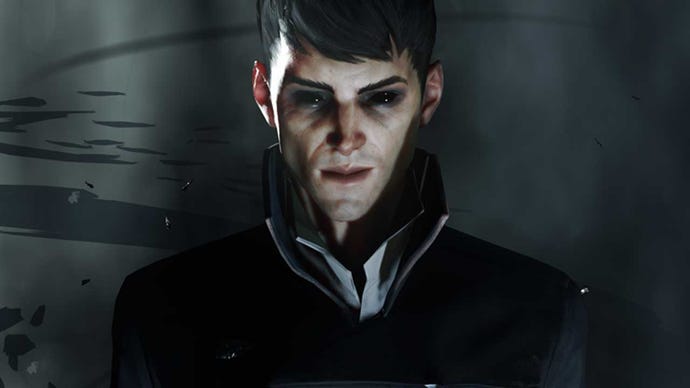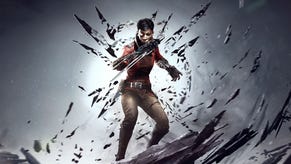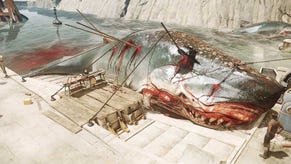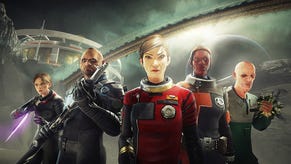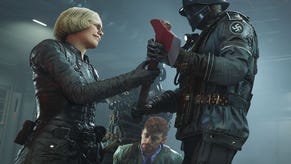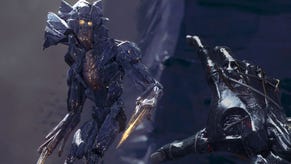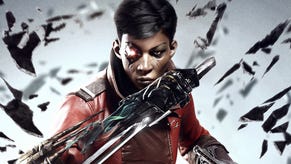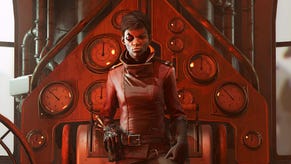Hands up if you'd bang Dishonored 2's Outsider
Dishonored 2 brings back one of the most bangable gods ever to turn you lose with a bag of supernatural tricks and then irresponsibly leave you to it.
One of the reasons Dishonored strikes such a chord with fans of old school Thief - besides the obvious first-person stealth thing - is its setting: a fantasy world, with supernatural elements, but firmly grounded with historical references. It's a heady mix. (Even after tens of hours of overtime writing a Dishonored 2 guide, I'm pretty into it.)
My favourite element of the Dishonored universe (besides the rad outfits) is the Outsider. This mysterious, morally ambiguous figure turns up in Corvo and later Emily's time of need and offers them the power to change the world - but makes no effort to control his chosen one, leaving it up to the player to decide how best to approach the situation in the Empire.
"The Outsider came into existence as a being of insatiable curiosity about what people do when given power over others."
We don't often see real ambiguity in games - and Dishonored pulls it off really well. The Outsider seems equally impressed by your ability to bring about chaos as to find trickier, more peaceful solutions - even if he's not exactly pleased by it.
"To me the Outsider is a projection of ourselves in the original Dishonored," Arkane art directer Sebastien Mitton told me recently.
"When you look at this guy, he’s not real, he’s a projection - but it’s twisted, a twisted version of you. That’s why he’s androgynous. Because if you are female playing Corvo, you want this reflection in the Outsider. That’s why he is like this."
Perhaps the Outsider appreciates your playstyle in the same way you appreciate your playstyle. This does not explain why he's so cool though, does it; that part's definitely not a reflection of yours truly, that's for sure.
But the Outsider isn't truly neutral, as Arkane boss Harvey Smith hinted in an oft-quoted September interview with GameRevolution.
"Some people mistakenly thought of him as a trickster god or as amoral or indifferent or something, and that's not actually how we present him," he said.
"This time, we go into his backstory. And we present him as someone who has suffered great abuse in his normal life, his real life, and therefore when he merged with the Void to become godlike in a sense - not omniscient or omnipotent, that would be kind of boring I think - he struggles to maintain some sort of human consciousness probably.
"But he ends up picking people who are going to be pivotal to large numbers of people, people in history, pivotal in that part of the world, and he kind of anoints them and gives the access to great power. And he fully, cynically expects them to abuse that power and lord it over other people, and when they don't, he's pleasantly surprised. It's such a break from the norm from what he's used to, and so he serves, I feel, like as a thematic touchpoint for the abuse of power."
You can see why the Outsider would have a cynical view of humanity; the world of Dishonored is one where the strong abuse the weak. One of the repeat messages of a low-chaos Emily run is that the empress has been too divorced from her people and their suffering, locked up in her tower, bored by the administration of her court, able to go back to a life of luxury whenever she tired of her illicit rooftop excursions. She's oblivious to the injustice.
And, as Smith hinted, the Outsider experienced that power imbalance first hand in his human life. You should stop reading right now if you want to avoid spoilers, because I want to talk about content from Dishonored 2.
There are two key sources of information on the Outsider in Dishonored 2. One is the Outsider himself: On one of our hero's visits to the void, we see the altar where a 15 year old human boy was sacrificed, and the Outsider tells us this is when he was born as a god - about 4,000 years ago, according to Smith.
He also tells us he believed, right up until the knife touched his throat, that he would escape somehow: he didn't want to die, whether he'd become a god or not. It's a powerful scene, and I note Arkane, which normally hones its collision with razor precision, opted to wall the altar off with invisible barriers; you can't teabag the ancient bloodstain marking the Outsider's creation. I don't usually approve of this sort of thing but I doubt the Outsider, as the will of the Void, is particularly keen to see humans touching this place with the power to create gods - especially as the Outsider's throne is already trembling in Dishonored 2 (more on that later).
The second source of information is a document obtained from the minstrels you can meet in a couple of locations around Karnaca. Called In The Month of Darkness, this sheet of lyrics tells us what the people of the Dishonored universe know - or think they know - about their strange deity. You can read them in the sidebar.
These lyrics, and the Outsider himself, tell us of the ritual that turned a human boy into a god worshipped - albeit illicitly in the current era - all across the empire. Why the cult sought out a suitable candidate, why it worked to bring a representation of the Void into being, is another mystery.
The Abbey of the Everyman, the most prevalent religion of the empire, believes the Void is the source of dark spirits, and sows discord in the hearts of humanity; it considers worship of the Outsider, as the avatar of the Void, to be heresy, and comes down very hard on magic and associated practices.
Nevertheless, the practices continue; just as there will always be those who don't think to ask the Void for help, but receive the offer because they're so perfectly positioned to tip the scales of history, there will always be power-hungry humans seeking to draw from the Void, whose ability to disrupt attracts the Outsider's interest. And in a world as unjust as that of Dishonored, of course there will those who turn to the Void for comfort, never expecting anything spectacular, but content with communion at the shrines, or the small powers of a bonecharm.
The Outsider is known to have favoured up to seven human beings during the period of time covered by the Dishonored games: Vera Moray, the woman known as Granny Rags in the first Dishonored; a young boy who may have been the catalyst for the rat plague; Delilah Copperspoon, antagonist of both the Brigmore Witches and Dishonored 2; Daud, the Knife of Dunwall featured in Dishonored and its DLC; Piero Coplin, the inventor who aids the player in the first Dishonored; Corvo Attano and if the player chooses her, Emily Kaldwin.
Given how many champions the Outsider has chosen or responded to in a few decades, it's likely there are many more we never learn about - perhaps every shrine you find in the games belongs to someone who has interacted with the Void, although at the time of The Knife of Dunwall, we know there are only eight humans with the mark of the Outsider. Some of these were chosen, and others called for the Outsider and got an answer. But some are never answered, as with Anton Sokolov, who called on the Void again and again with no luck, unless you count Delilah's connection to the Void one of Sokolov's successes, which he probably wouldn't.
That's probably why Sokolov's painting of the Outsider, shown in the sidebar, is faceless; Delilah's, on the other hand, shows plenty of detail in her signature style. There's a new painting of the Outsider in Dishonored 2, but I couldn't find a clean copy. If Sokolov painted it, he's either met the Outsider in the interim or developed an uncanny imagination.
Incidentally, the Outsider's look varies slightly from game to game and across various promotional artwork. His appearance in Dishonored 2 is a little more boyish, or perhaps more like his new voice actor, Robin Lord Taylor (AKA Penguin in Gotham); in the Dishonored Tarot he has a bit of a hint of Prince. According to Smith, the Outsider does not change his form much, and appears "almost" as he did in life - he looks a bit older than 15 to me, as you'd expect after 4,000 years of contemplating the Void.
Much of what we know about the Outsider comes direct from Smith, answering fan questions; we're indebted to members of the Dishonored Wiki for collating and capturing these replies for posterity.
For example, Smith once said the Void "hungers for a representational, godlike entity".
"During the times when none exist, the Void eventually spawns another. The primal forces shift and realign, creating the right conditions for the birth of a new divinity... which is unique and lasts until some catastrophic event ends its existence."
So there have almost certainly been other entities in the same role as the current Outsider, but we have little hope of knowing anything about the others. Smith said "nothing is known" of the representational entity before the Outsider, "or how it was lost or destroyed", but that there were sects who worshipped or loathed these past entities, even as there are today.
"Each time, this natural process is different. Each time, the entity is different," Smith said of this cycle.
"We do not see the Outsider as a trickster god. The Outsider came into existence as a being of insatiable curiosity about what people do when given power over others."
There it is again - that reference to power over others. But that may not be something inherent to the Outsider, in his essential self as a human or the Void: it could well be a product of the times he was born into.
"The Void sometimes has a divine entity, and sometimes does not. Some last for thousands of years. Sometimes the gap between them lasts as long," Smith has said.
This implies the Void's yearning for a representational entity comes about in response to something, rather than on a set pattern, and I think Smith's next comment bears this theory out.
"Each [representational entity] takes on the attributes of the times or process that made it."
Perhaps the Outsider's interest in how humans use power has to do with the activity of the age: industrialisation, the exploitation of natural resources, enormous disparity between rich and poor.
As for how the Outsider and his ilk come to an end, Smith said entities have ended in multiple ways "over the millennia": by fading away, abdicating, accidentally being destroyed, by deicide, or by being reclaimed by the Void.
Except for the accidental destruction, I think all of these tell us something about the Outsider and his kind. That they can be reclaimed by the Void or simply fade away suggests the Void itself eventually no longer feels the need for representation, possibly due to the cessation of whatever stimulus prompted the creation of an entity.
That an entity can abdicate is interesting, and suggests the creation process, or the subject chosen for it, is not always perfect, and the entity can't be held to their post. This last bit really intrigues me, because there's some evidence the Outsider's existence is difficult. We know he didn't choose his role, we know the Void is endlessly cold and friendless, and we know looking into the Void is "horrible". (I can't track down this tweet suggesting the Outsider lives in fear, so it might be a Photoshop job, but it stuck with me anyway.)
And finally, there's deicide - the deliberate killing of a god. Until the Outsider catches the hero's hand as they stumble on the edge of an island in the Void, I had thought of him as completely intangible. (Tangent: the revelation that he isn't, the subtle expressions on his face during this time, and our complete freedom to imagine our character's own expression and thoughts at this time have fuelled a torrent of extremely steamy fanfic.)
But anything that can be touched can be killed. If you weren't paying attention to dialogue and cutscenes during Dishonored 2 (and, unfortunately, evidence suggests most people playing games are not paying attention to dialogue and cutscenes) you might have missed the fact that Delilah isn't just out to become empress and to remake the world as she likes it: she's attempting to replace the Outsider as the representation of the Void.
This plan is possible because in the course of resurrecting herself, Delilah has somehow managed to make herself a part of the Outsider. "And I don't like it," he says - but that and his offer of assistance to Emily and Corvo is the only indication he gives that in achieving your vengeance and saving Emily's throne you also preserve his existence. I wonder if his reticence is because he half wants Delilah to succeed, because he fears Emily and Corvo may want him gone, or simply because he doesn't care either way? Does he want a particular outcome, or does he merely throw you the tools and knowledge he thinks will result in the most entertaining messes, regardless of what you do?
The Outsider makes multiple appearances in Dishonored, the DLC and Dishonored 2, and of the best things about the Outsider is something we've already touched on - that in most situations he adapts to your actions. If you want to hear absolutely everything the Outsider has to say in Dishonored 2 alone, I think you're looking at at least four and maybe as many as six playthroughs. I've only completed a low chaos Emily run and started a high chaos Corvo run, and browsing Tumblr to find images for this article I came across a stack of quotes I'd never seen before. (See the Dishonored Wiki for full text of all variations from Dishonored; let's hope the community does the same for Dishonored 2.)
Even if you do track everything down, the Outsider remains delightfully ambiguous and open to interpretation. One of my favourite threads of Dishonored fandom represents the Outsider as a loveable trickster scamp who enjoys pinging in and out provoking an ornery Corvo, and that totally works (Corvo's line when first entering the Void in Dishonored 2 fits perfectly, for example). But the Outsider as a dark being something like a devil, manipulating events to bring out the worst in people around him, is equally valid - although I personally think it misinterprets his frequent sarcasm.
Another common fan interpretation has Corvo and the Outsider acting as odd couple parents to Emily, which takes both comedic and tragic turns. And of course the slash fandom is all over Outsider/Corvo, and a pairing painfully labelled "Emsider".
Personally, I'm a big fan of the Outsider as a tortured being with a very dark but whimsical sense of humour, who takes delight in being proved wrong in his justified distrust of humanity as he strives to balance the remnant of his original self with the endless, hungry power channeled through him. But that's probably because something about these bloodless Byronic types plays merry hell with my personal placement on the Kinsey scale.
